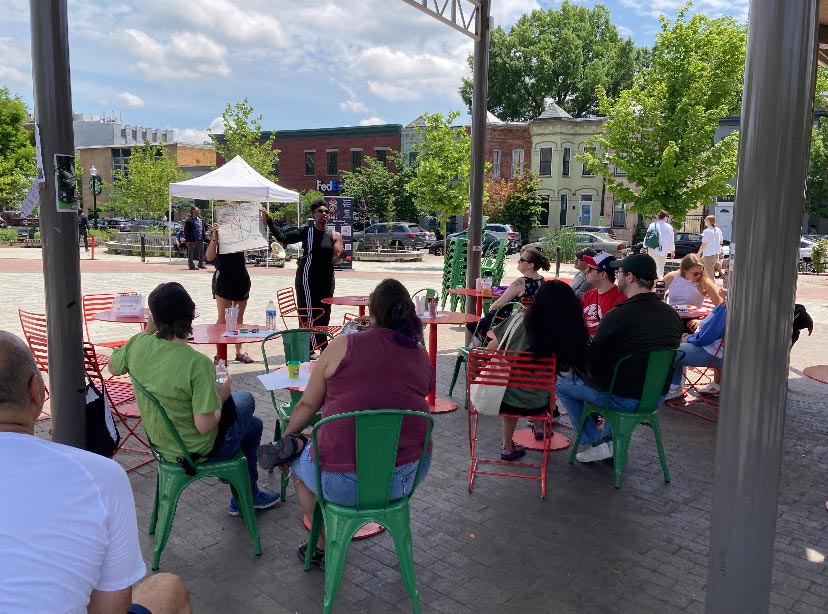Dec
How To Move Money From The Cops | Defund & Refunk The District
In Alex Vitale’s The End of Policing he states, “Steve Herbert shows that community meetings tend to be populated by long-time residents, those who own rather than rent their homes, business owners, and landlords. The views of renters, youth, homeless people, immigrants, and the most socially marginalized are rarely represented. As a result, they tend to focus on “quality of life” concerns involving low-level disorderly behavior rather than serious crime.” Vitale also notes that, among other things, “Participatory budgeting … will do more to improve the well-being of communities than enhancing the power and scope of policing.”
Defund & Refunk The District combines music, art and participatory budgeting to ask residents what public safety would look like without the police. When we host participatory budgeting in public parks, we often reach people in the community who are often left out of budget conversations.
What is Participatory Budgeting
Participatory budgeting is “a citizen engagement process through which community members decide how to allocate a portion of a public budget.” Participatory budgeting allows residents most often left out of city budget conversations to engage with how tax dollars are allocated, learn what agencies get the most funding year after year, and make recommendations on what should be funded. In Defund & Refunk, we bring in original music, spoken word, public speakers, political education, and creative artmaking. We hosted three sessions in three unique neighborhoods in Washington, DC. Neighborhoods where the DSA has a small imprint, and needed to build trust. Instead of organizing the event in the more DSA-concentrated quadrant of NW DC, we first went to parks in NE, SE, and SW DC.What We Did
”We intentionally designed this workshop to be accessible and repeatable. We want to share what we've learned with others who want to start their own workshops in their city or town.
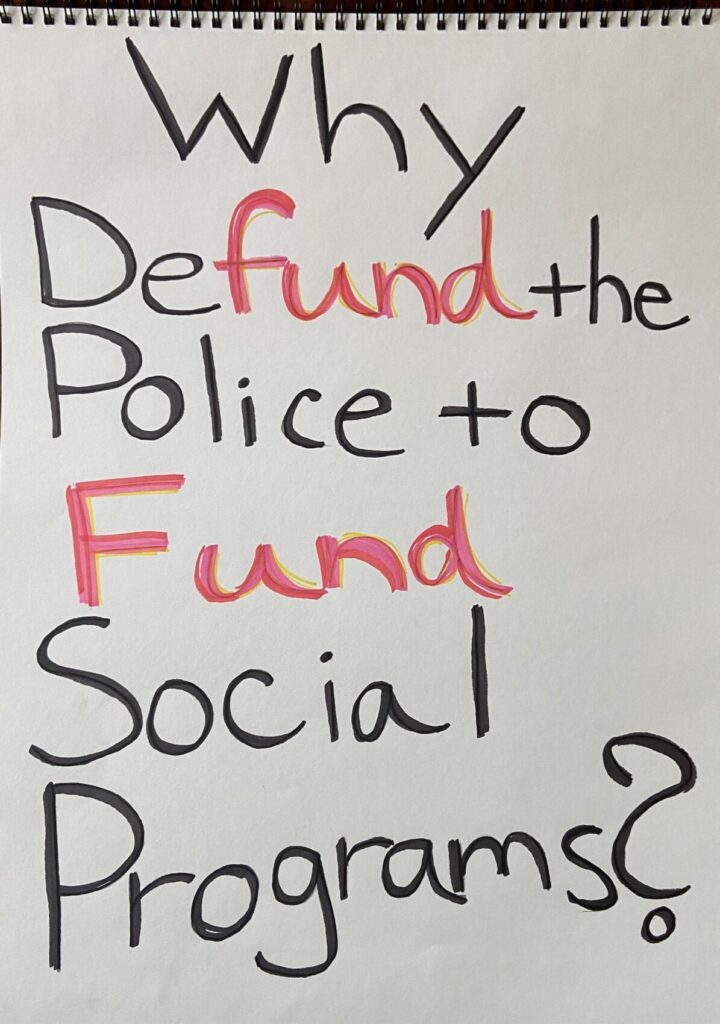
Performance and Poetry
Good Vibe Tribe, a music and artist collective, partnered with Metro DC DSA’s Defund MPD campaign, and were integral. From renaming the event, to refining the time spent on the workshop this was a full team effort.Political Education and Participatory Budgeting
”Next we explain the current city budget and how it is designed to mislead taxpayers at the actual size of the MPD budget. It may show up as a small percentage (5%) of the DC budget.To move money from the cop budget, you can’t just talk about one piece, but the whole pie. You have to talk about the imbalances of power as represented in the city budget. ... To quote Tobi Haslett, 'To fix one thing, you have to fix everything.'
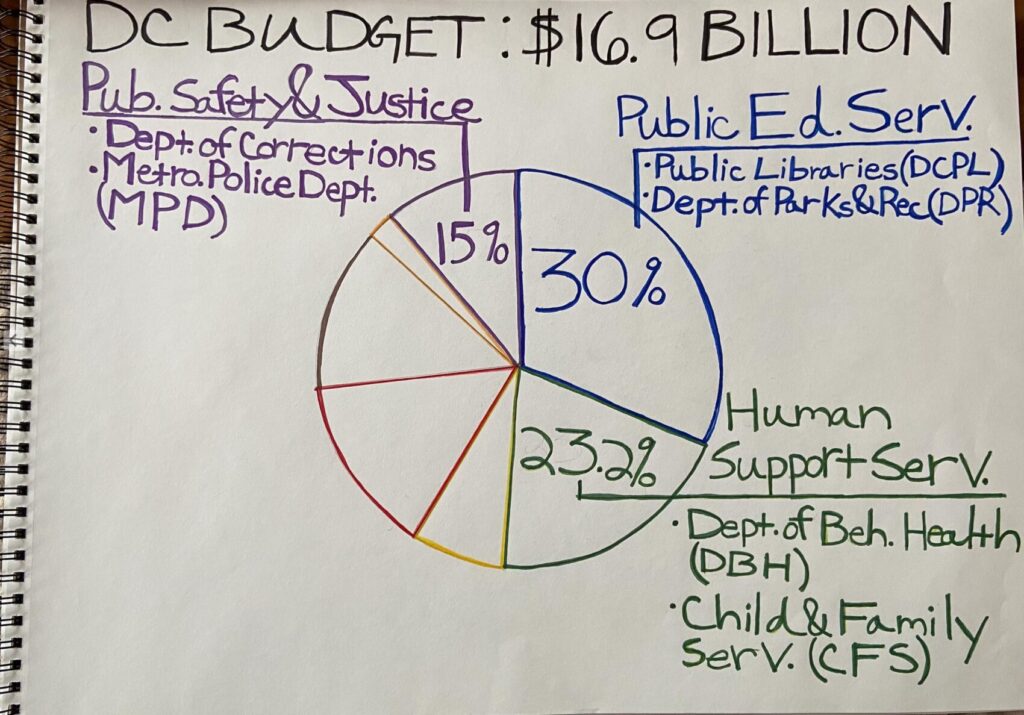
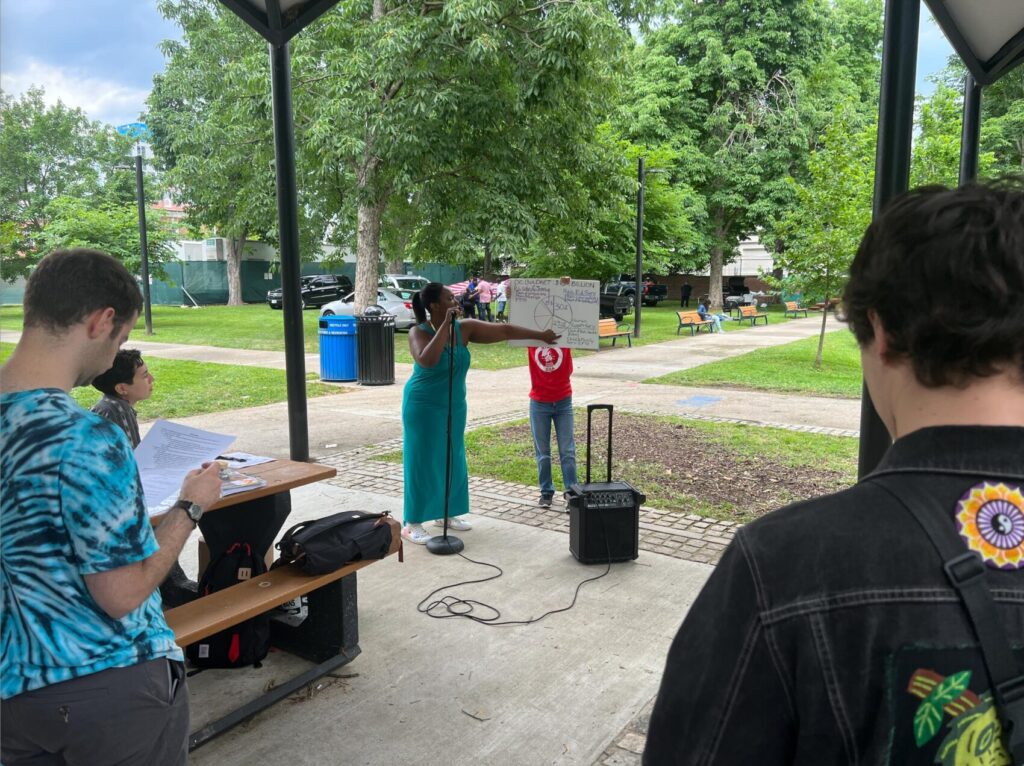
Metro DC DSA members in attendance present a breakdown of the 2022 DC budget, June 2022, Lansburgh Park Pavillion, Southwest DC
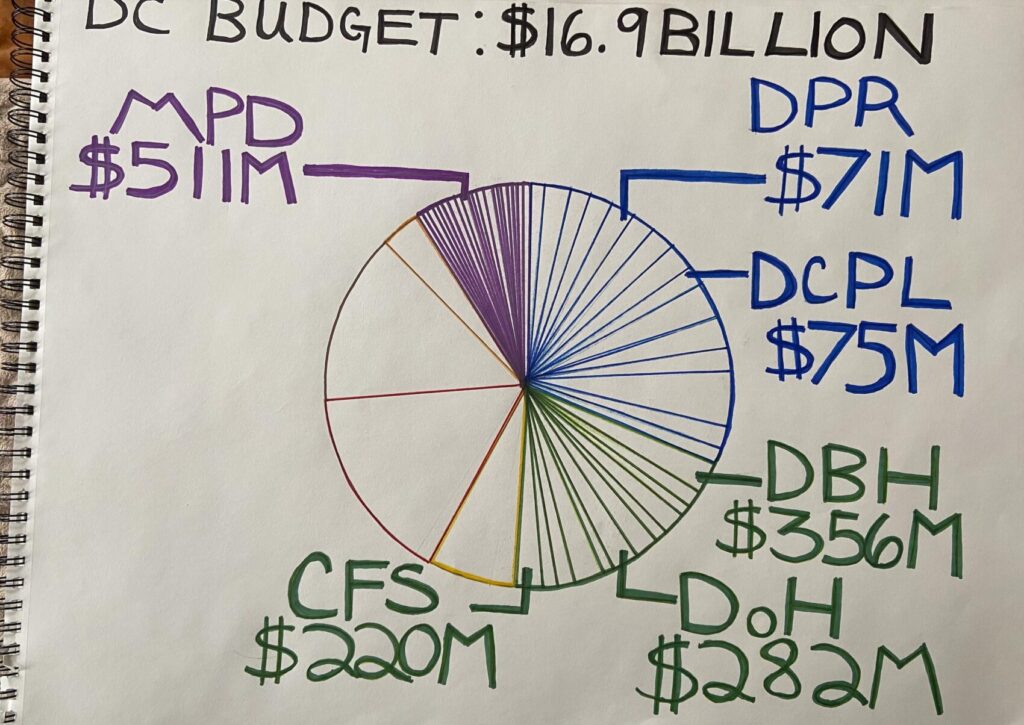
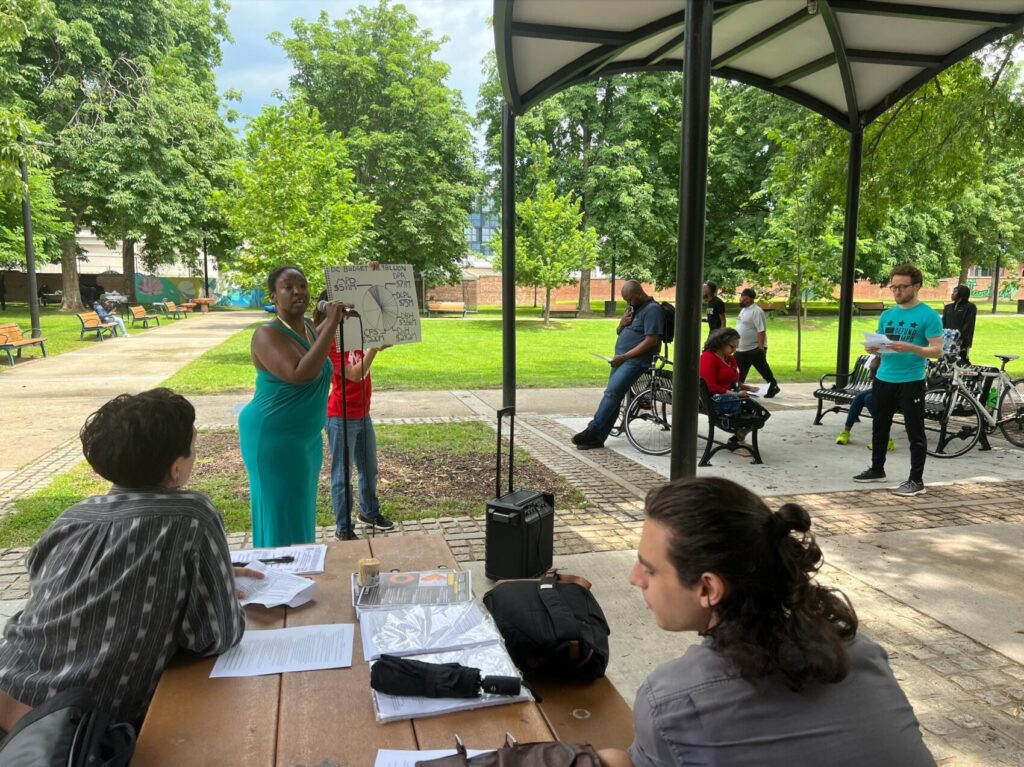
Metro DC DSA members in attendance present a breakdown of the 2022 DC budget, June 2022, Lansburgh Park Pavillion, Southwest DC
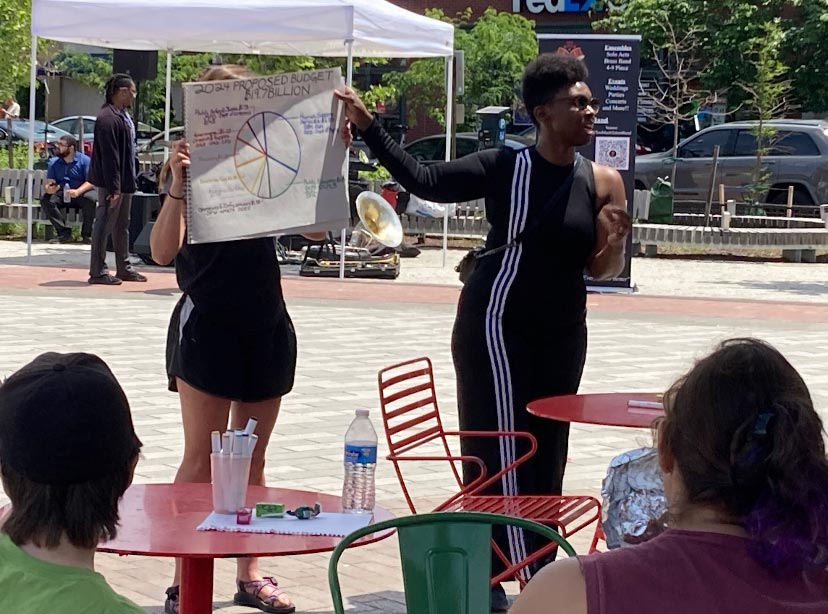
Metro DC DSA members in attendance present a breakdown of the 2023 DC budget, May 2023, Market Park, Southeast DC
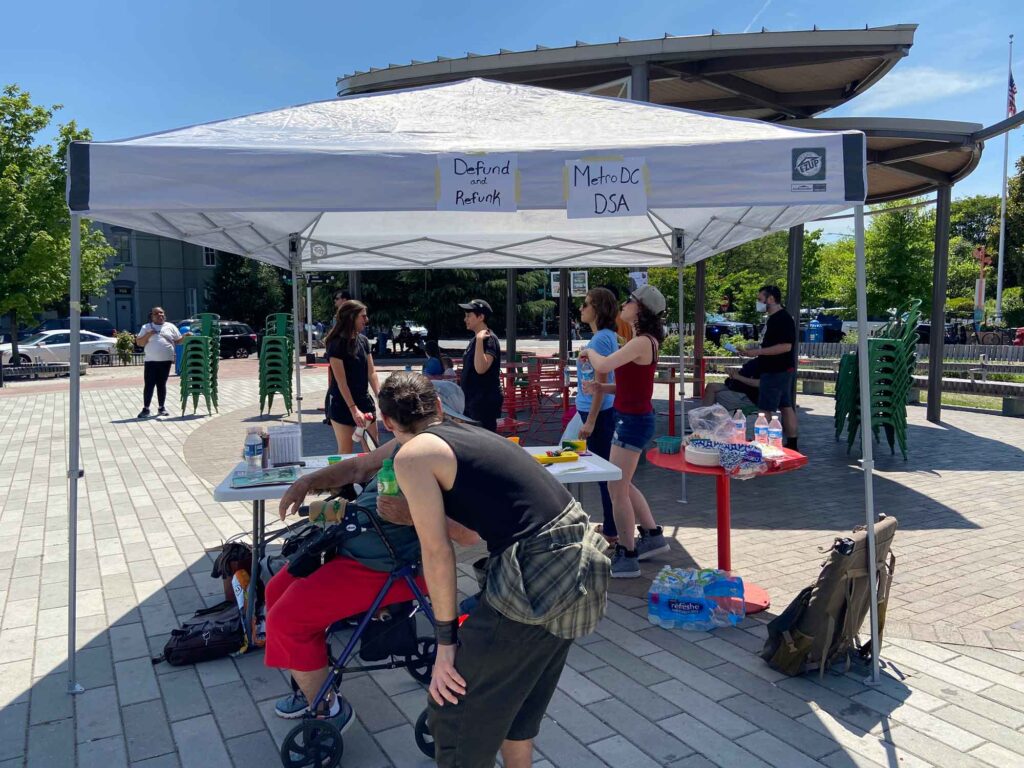
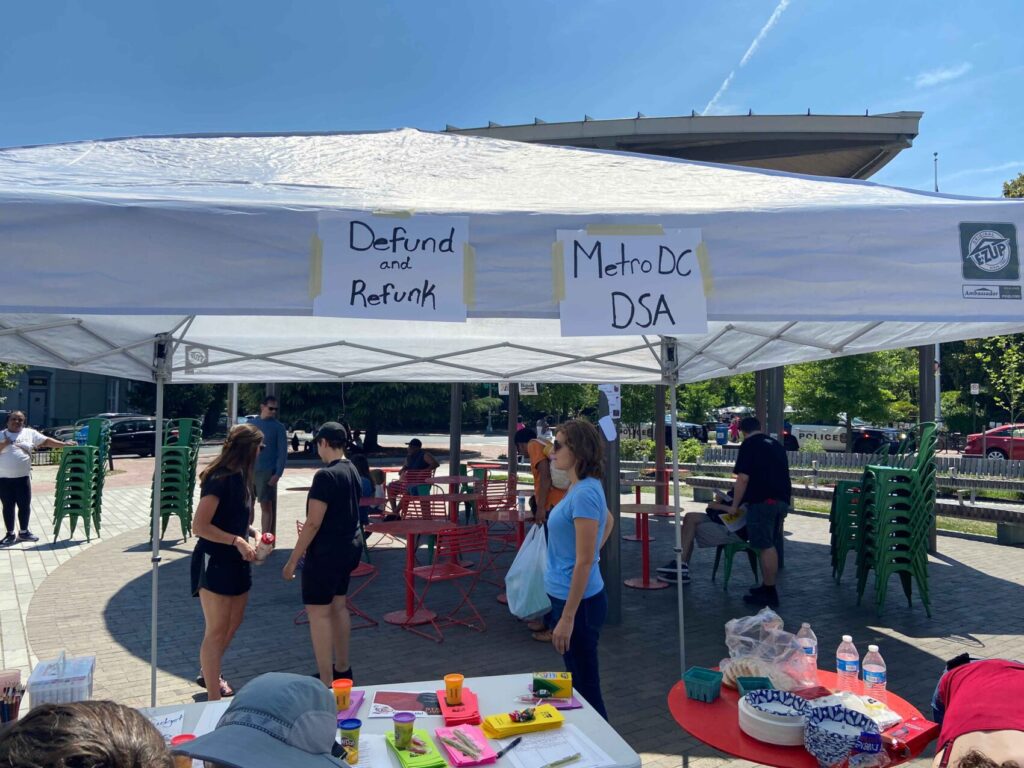
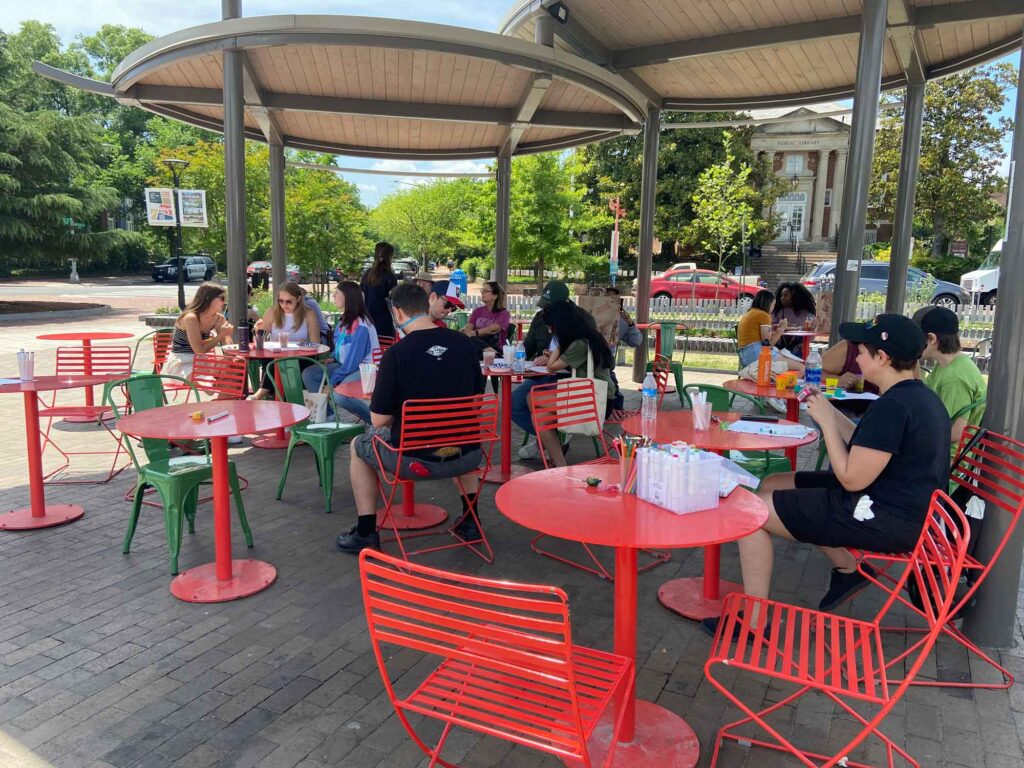
Art-making and Public ideas
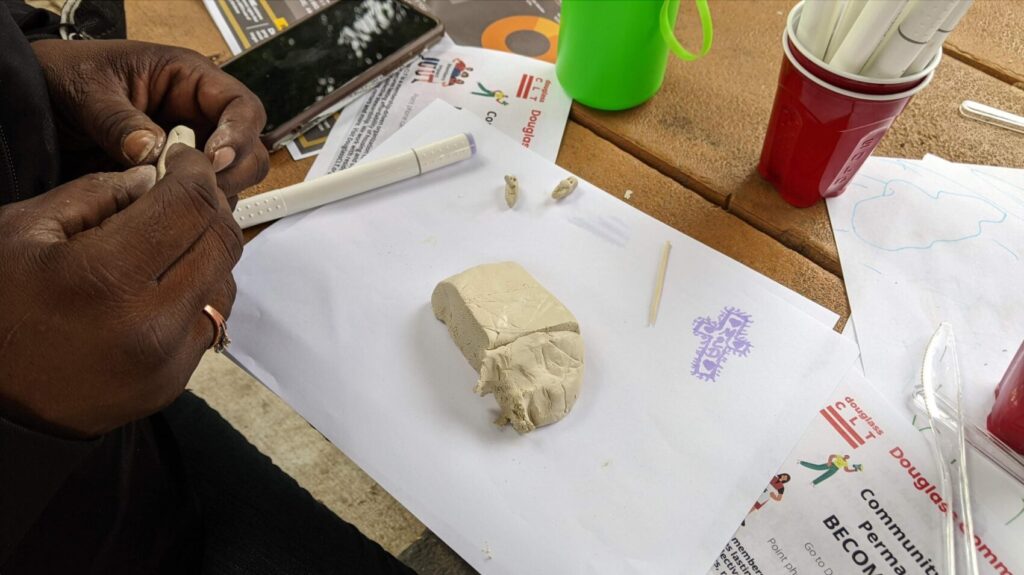 We told attendees that the goal of the Defund MPD Coalition is to cut the MPD budget 50% in three years. We asked them, if they had $250 million dollars, what would you do with it to improve the city, and where would it go? We then prompted attendees with a few more questions:
What about DC feels alive to you?
How would you want to have fun in your city?
What public amenities would you install?
Who are the people you know you can count on?
Is there a job for that?
We told attendees that the goal of the Defund MPD Coalition is to cut the MPD budget 50% in three years. We asked them, if they had $250 million dollars, what would you do with it to improve the city, and where would it go? We then prompted attendees with a few more questions:
What about DC feels alive to you?
How would you want to have fun in your city?
What public amenities would you install?
Who are the people you know you can count on?
Is there a job for that?
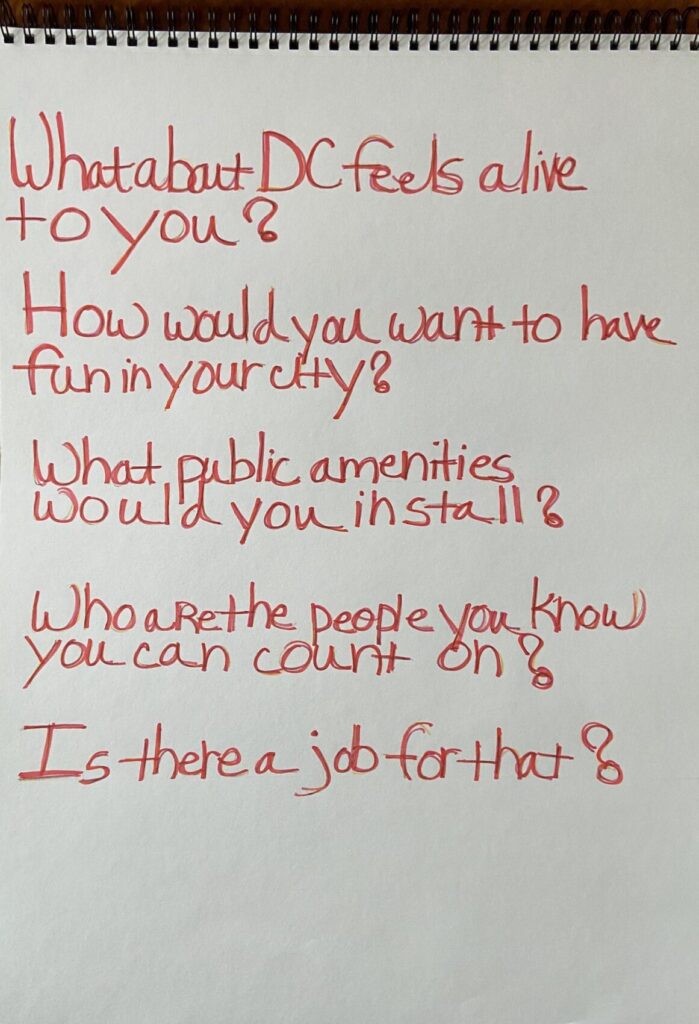
Here are some illustrations
Full Gallery | Defund & Refunk The District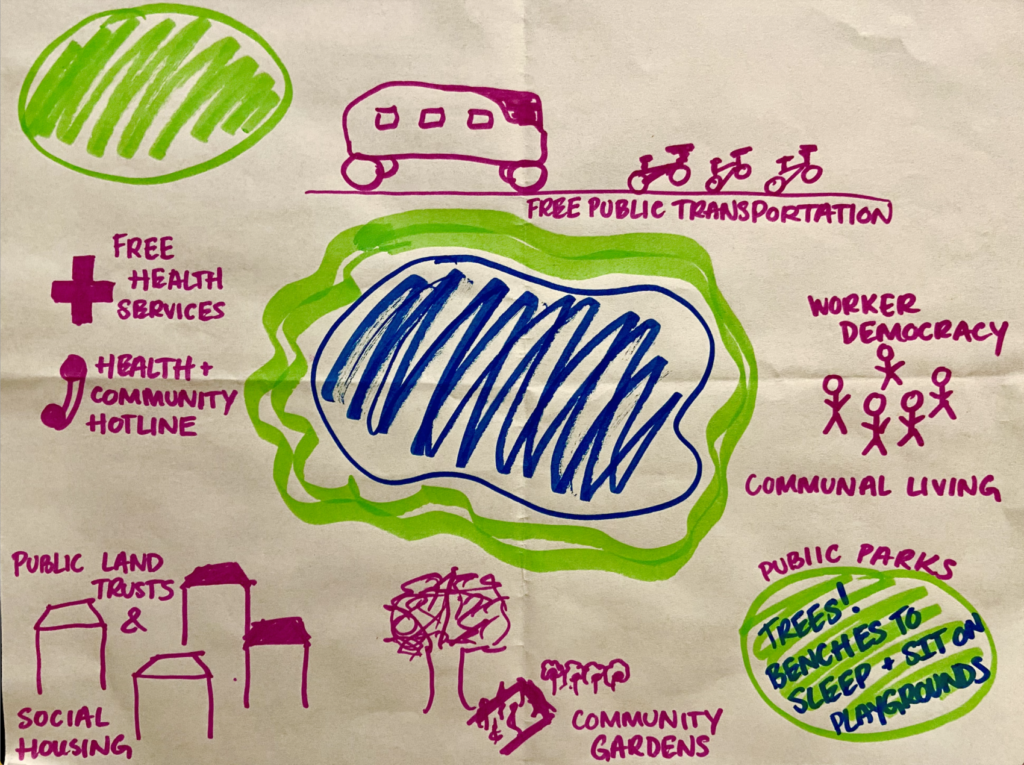
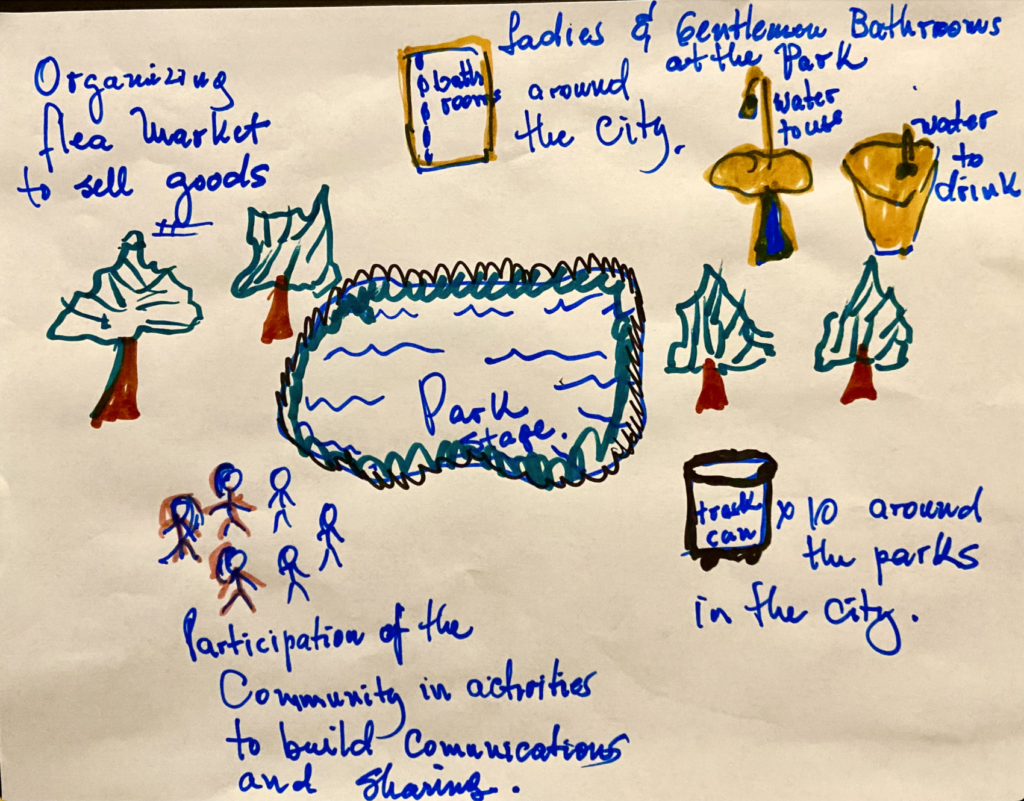
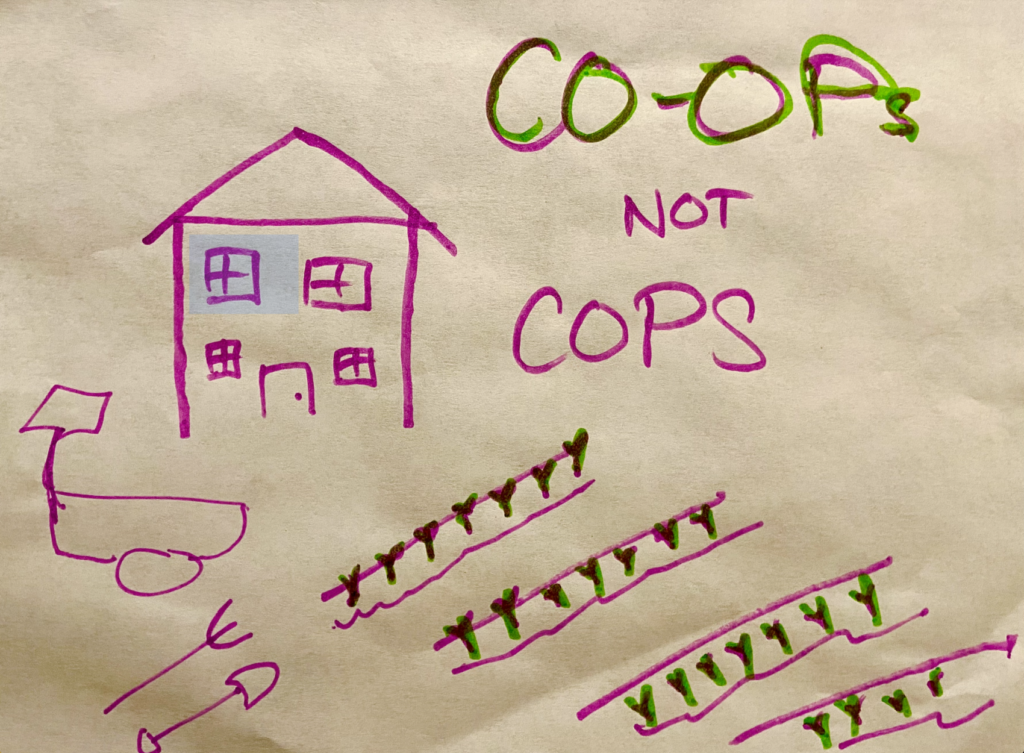
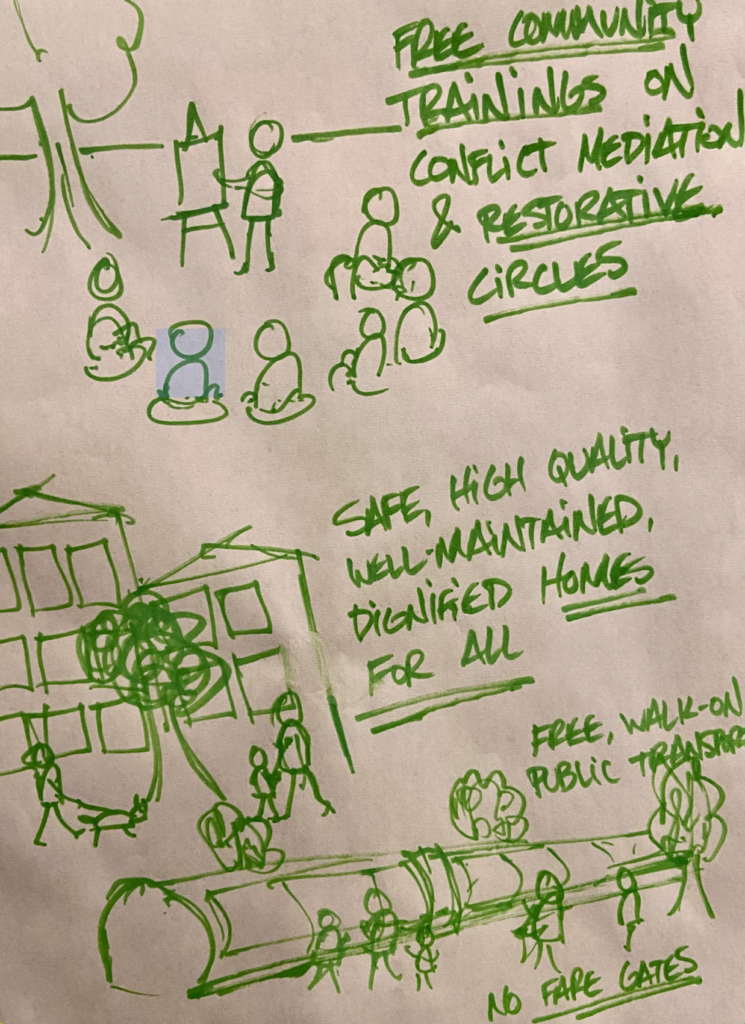
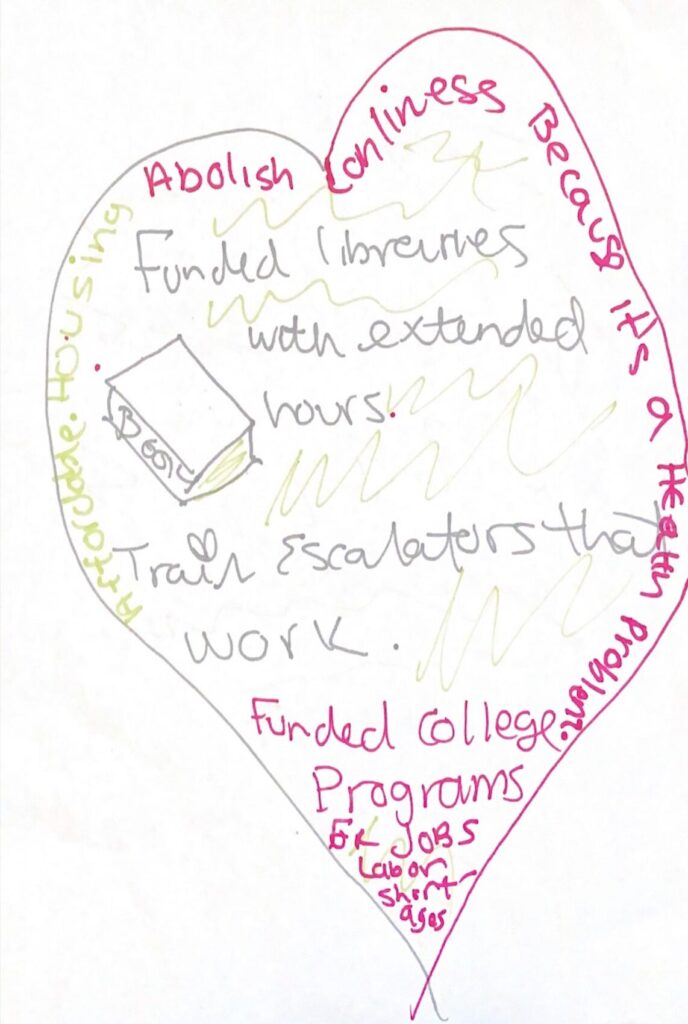
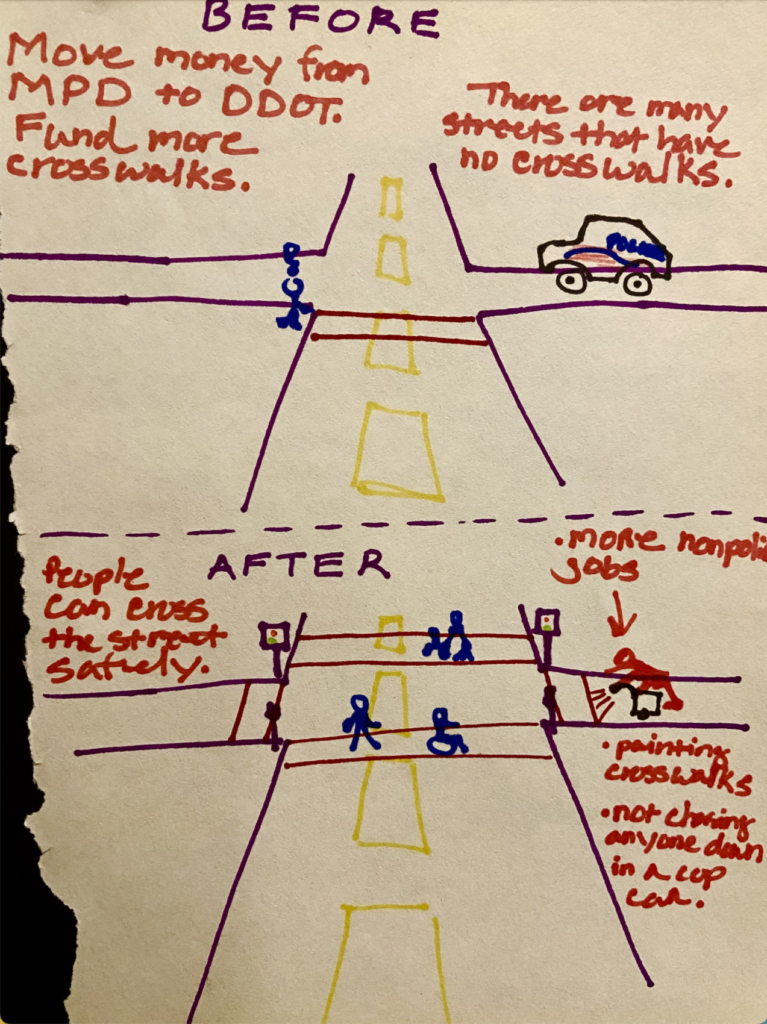
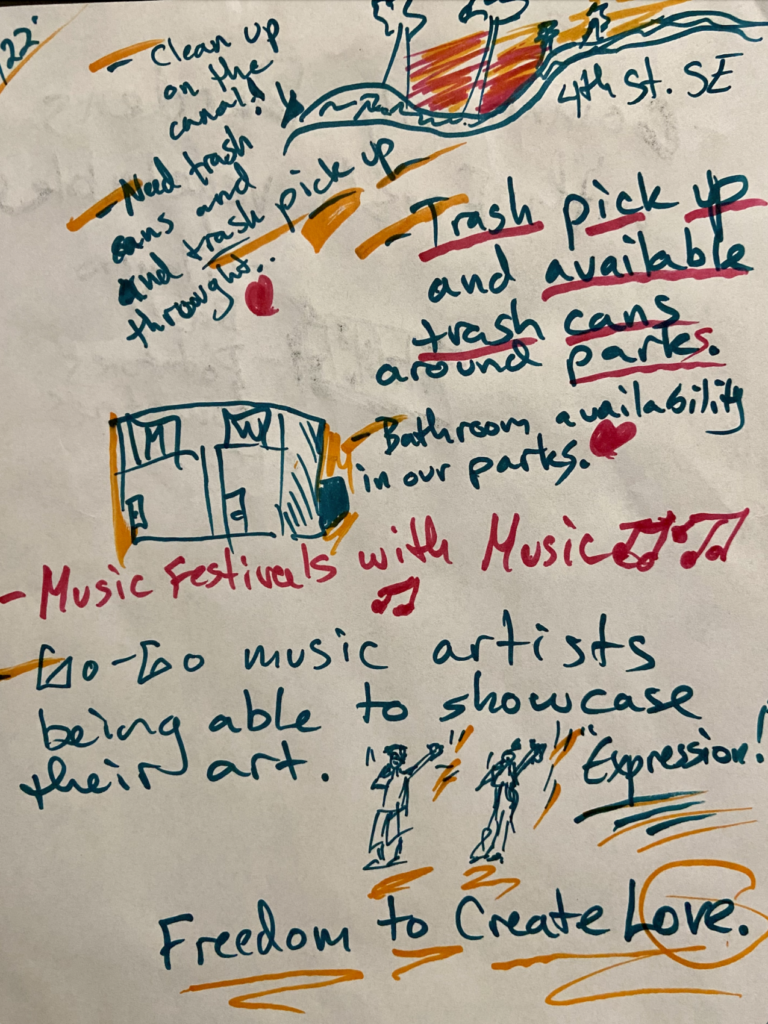
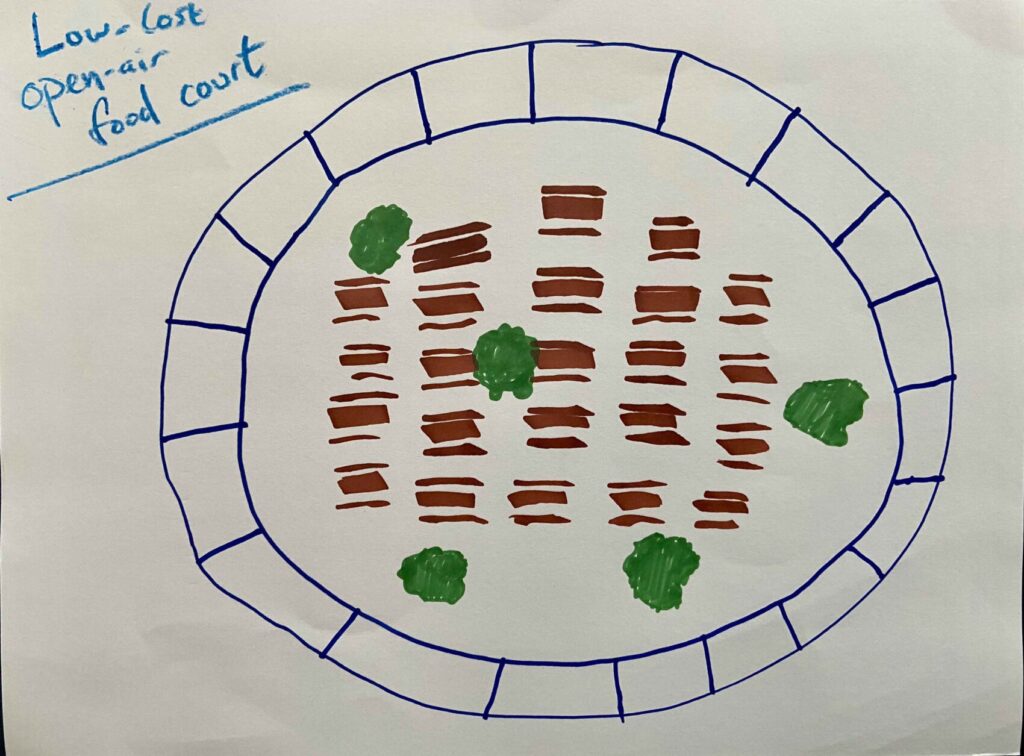
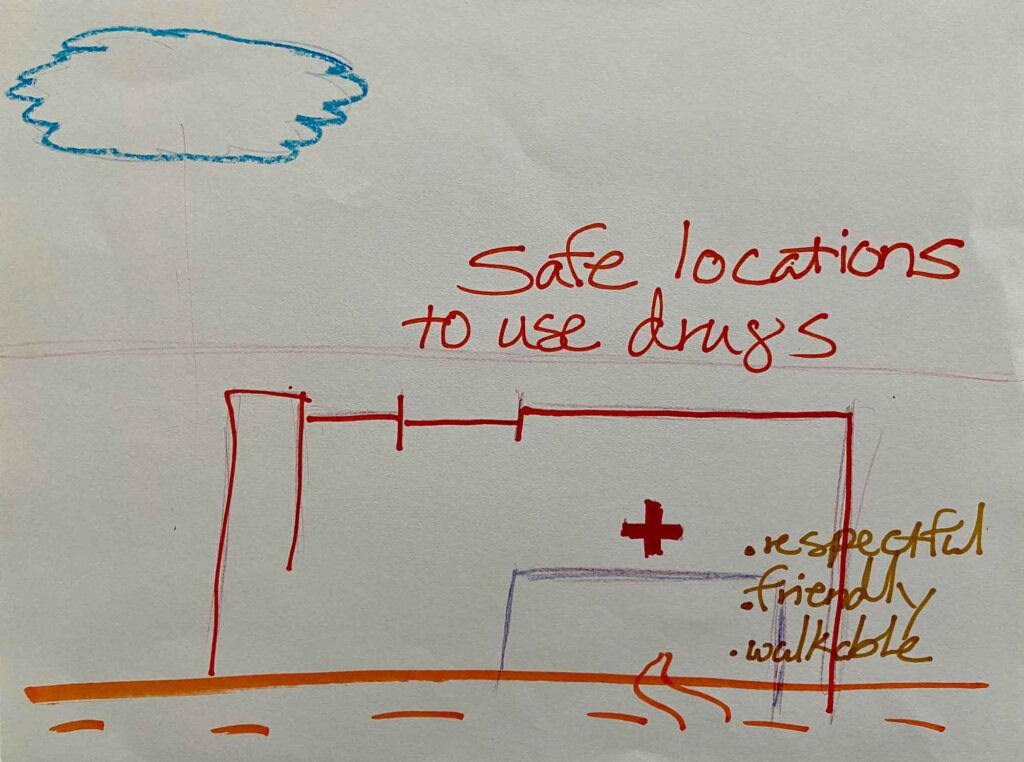
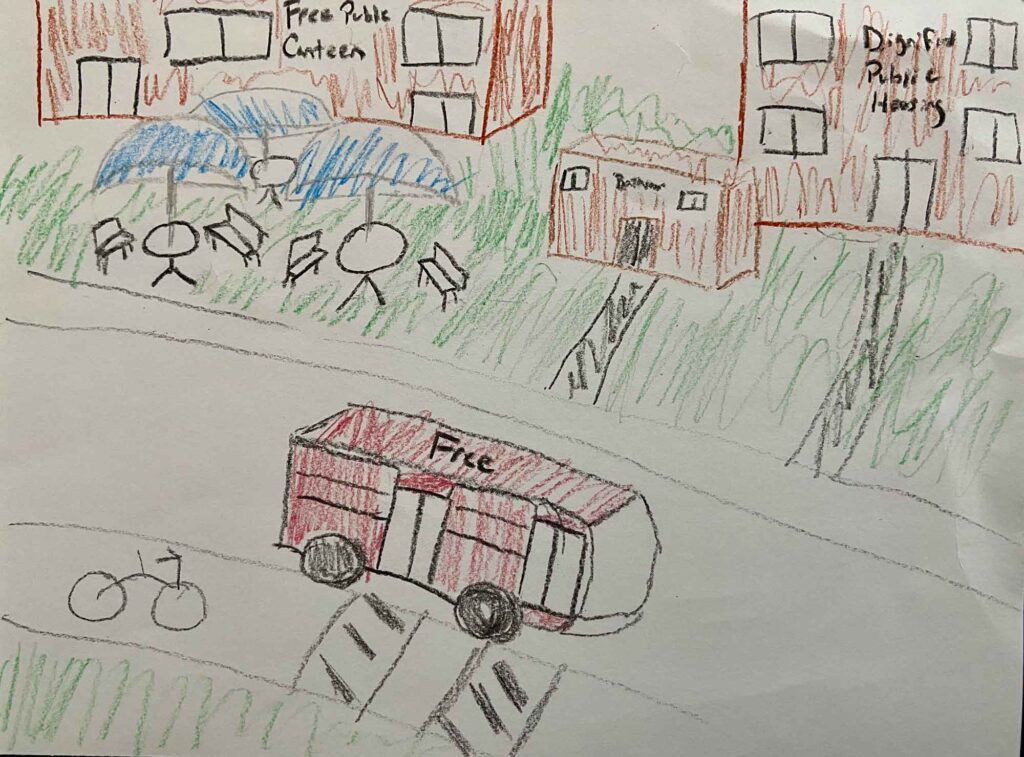
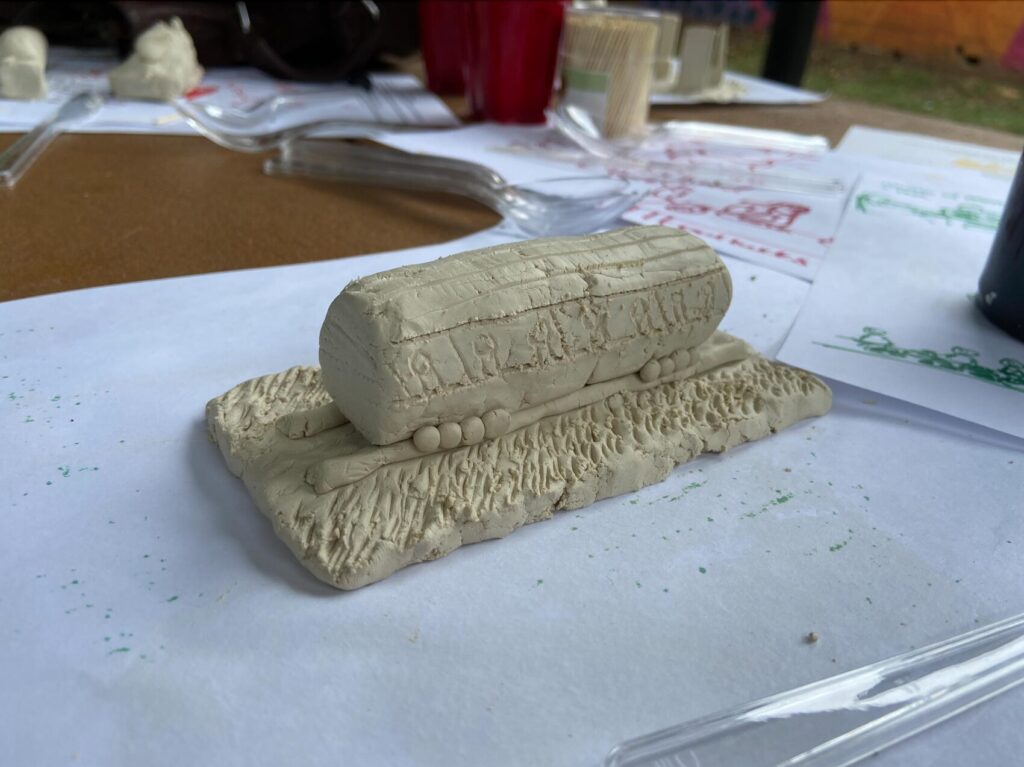
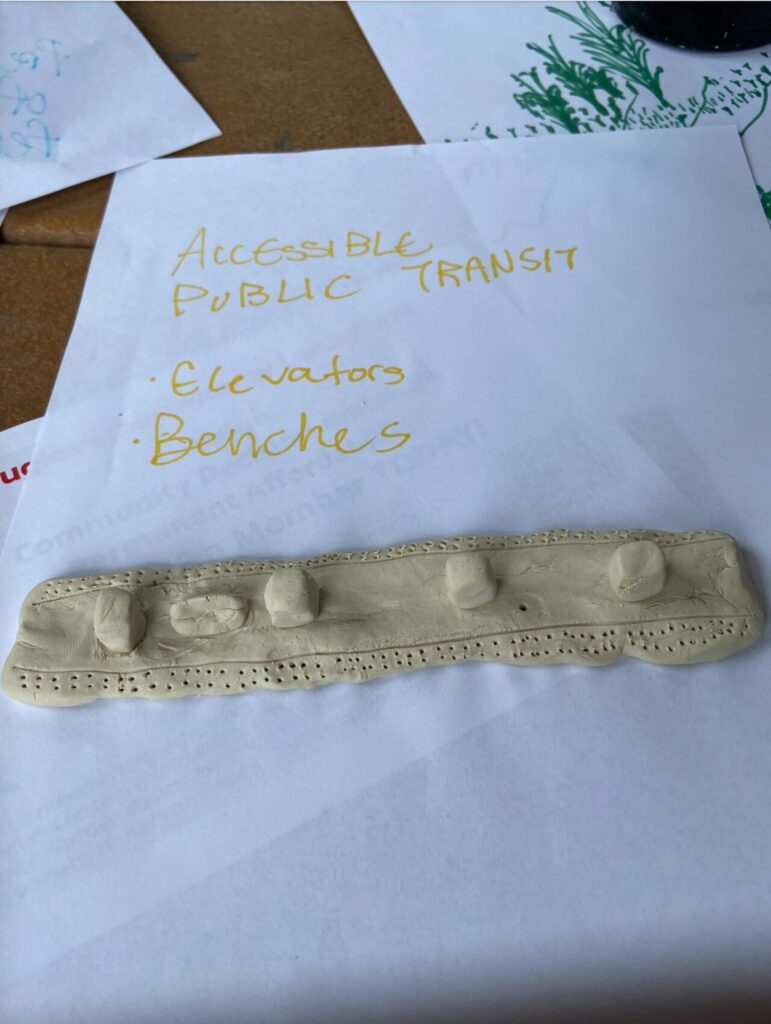
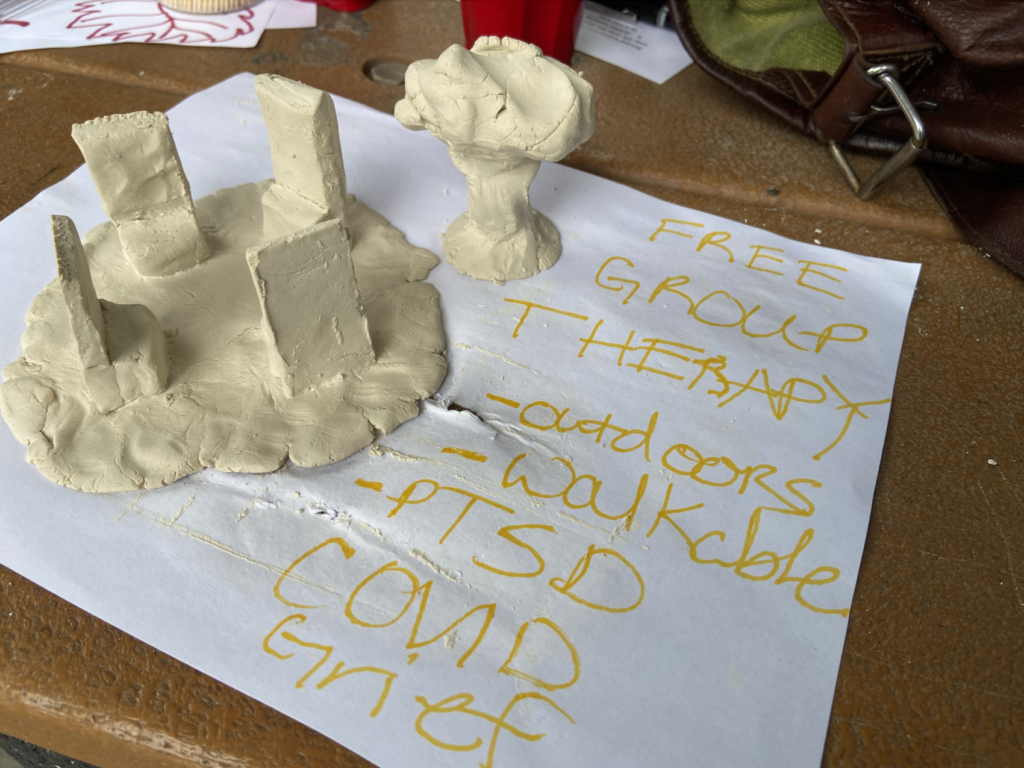
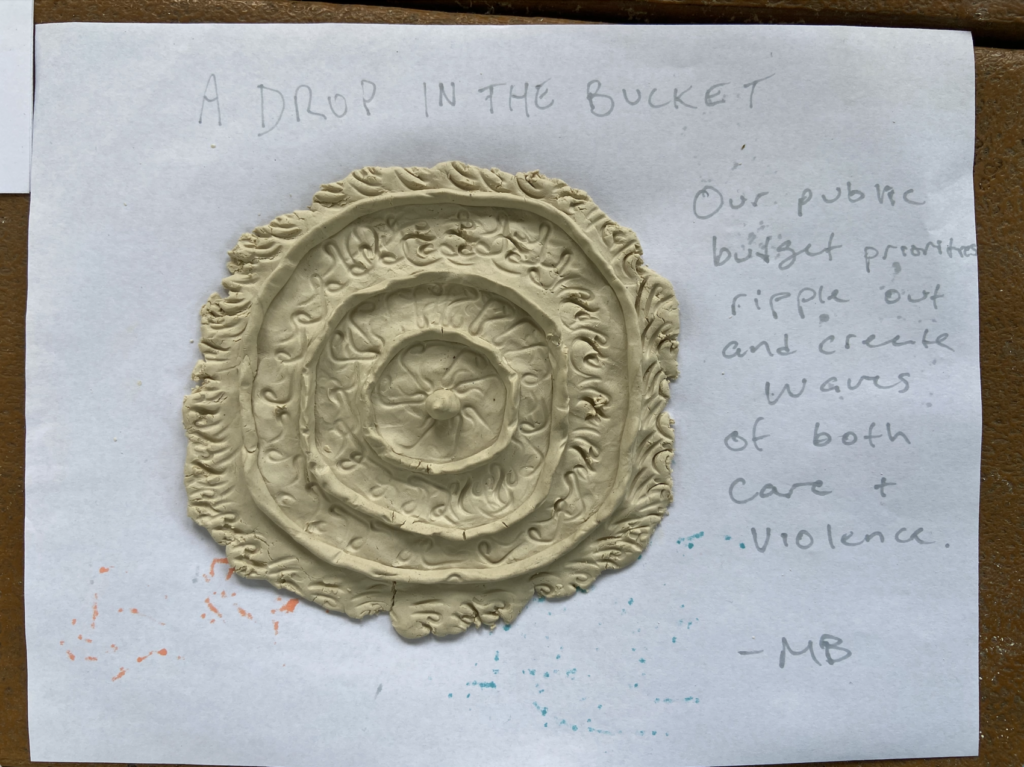
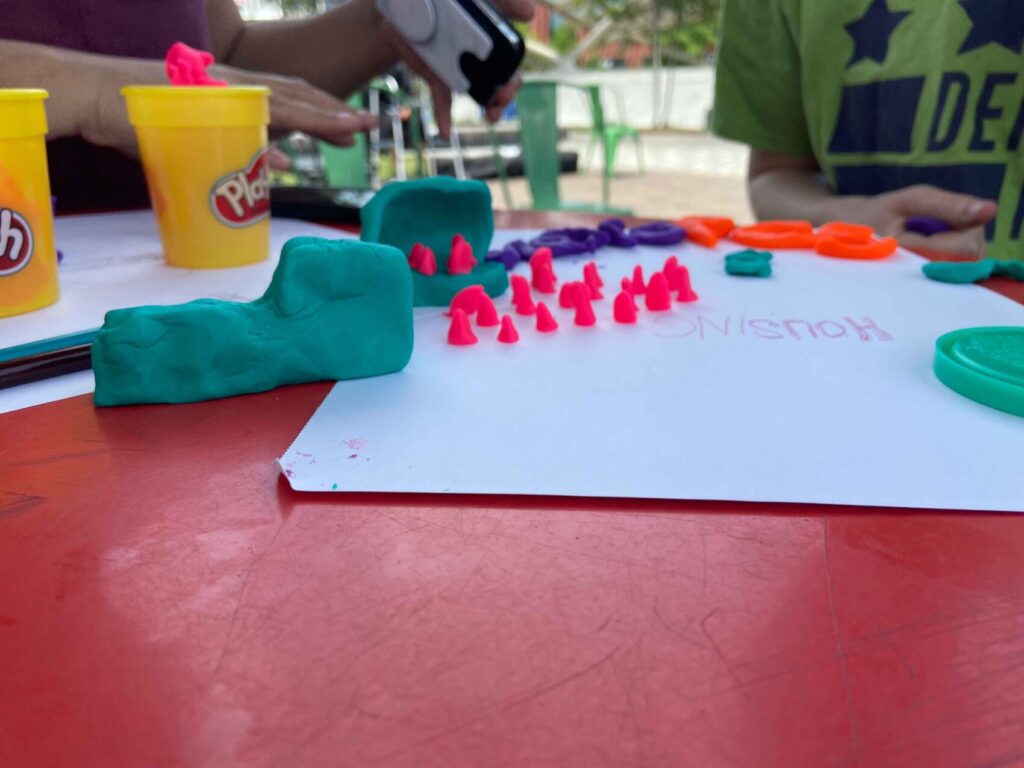
The Outcomes, As of 2024
For the past few years, the coalition successfully pushed back at some of WMATA’s more cruel measures such as decriminalization of fare hopping and banning people who had simply been arrested for a misdemeanor, without conviction. However, that is not enough. We need to have a more transformative response to law enforcement’s efforts to criminalize nonviolent acts. To prevent more criminalization of public transit, make public transit free and clean for all. We should all be able to go to work, go to a ball game, or see a friend without fear of being arrested for fare evasion. Free public transit came up time and time again in our workshops. The policy existed pre-COVID-19 pandemic under DC Councilmembers Charles Allen and Mary Cheh, but it was too small ($10 million) and means-tested ( only for job seekers). As members of the Metro DC DSA, we supported this, but it should be universal rather than means-tested. Our Political Engagement Committee agreed, and we continued our outreach to neighborhoods. In more recent news, The DC Council announced that starting summer 2023 the District of Columbia will make all buses free to all riders! We’ll be the first major U.S. city to have free bus service. They’ll also add overnight service for 12 bus lines and giving all DC residents a $100 monthly subsidy for using the bus. This is a huge step forward in our efforts!”Currently the MPD budget, adjusting for inflation, has remained flat, which suggests our efforts are making a difference. But let’s be honest, it hasn’t been defunded yet. However, there is a new, more progressive council that understands we have too many cops. There are current budget proposals to increase the hiring of more social workers, nurses, and health care workers within the DC Department of Health. However, it is not yet connecting with leaders that by providing more jobs for bus drivers, sanitation workers, apprenticeships, etc. — jobs that people in DC have been demanding for decades — alongside participatory budgeting, we have an opportunity to make those connections clear.We need to have a more transformative response to law enforcement's efforts to criminalize nonviolent acts. To prevent more criminalization of public transit, make public transit free and clean for all. We should all be able to go to work, go to a ball game, or see a friend without fear of being arrested for fare evasion.Free public transit came up time and time again in the workshops.
New Public Bathrooms at Alethia Tanner, Oxon Run Parks
In an amazing new development, DC Government approved a pilot program for free public bathrooms in several locations: Columbia Heights Plaza, Dupont Circle, Alethia Tanner Park, and Oxon Run Park. Throne Labs is being used to pilot the service. Below are exterior photos of the bathroom at Oxon Run Park and a video of the interior.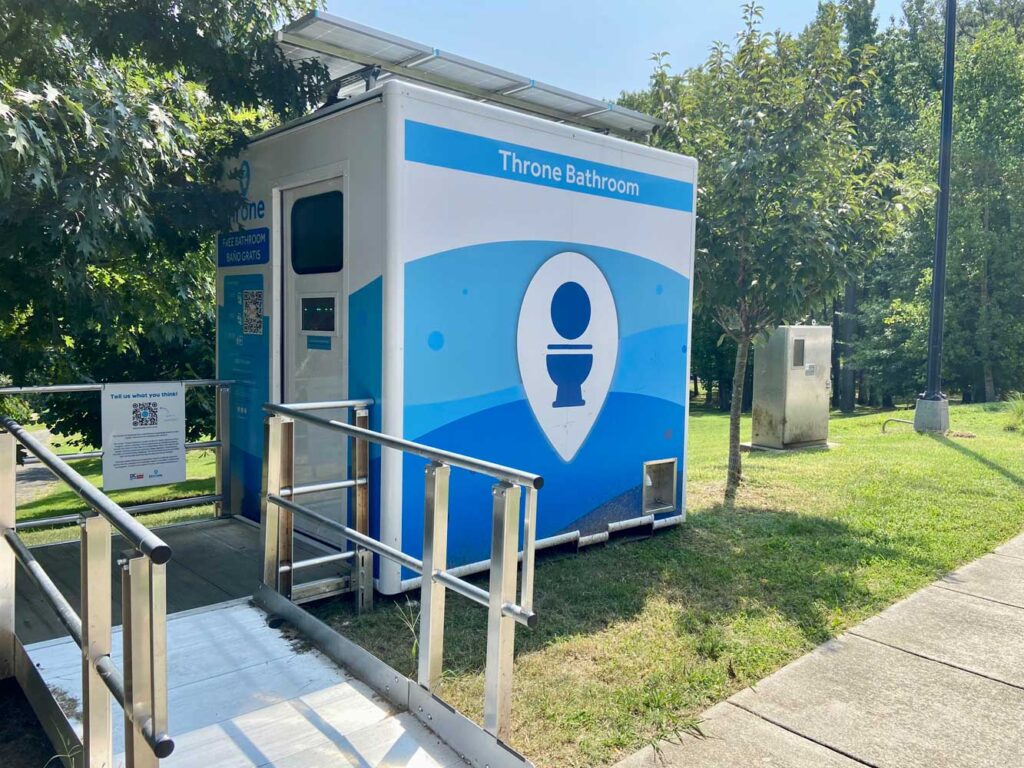
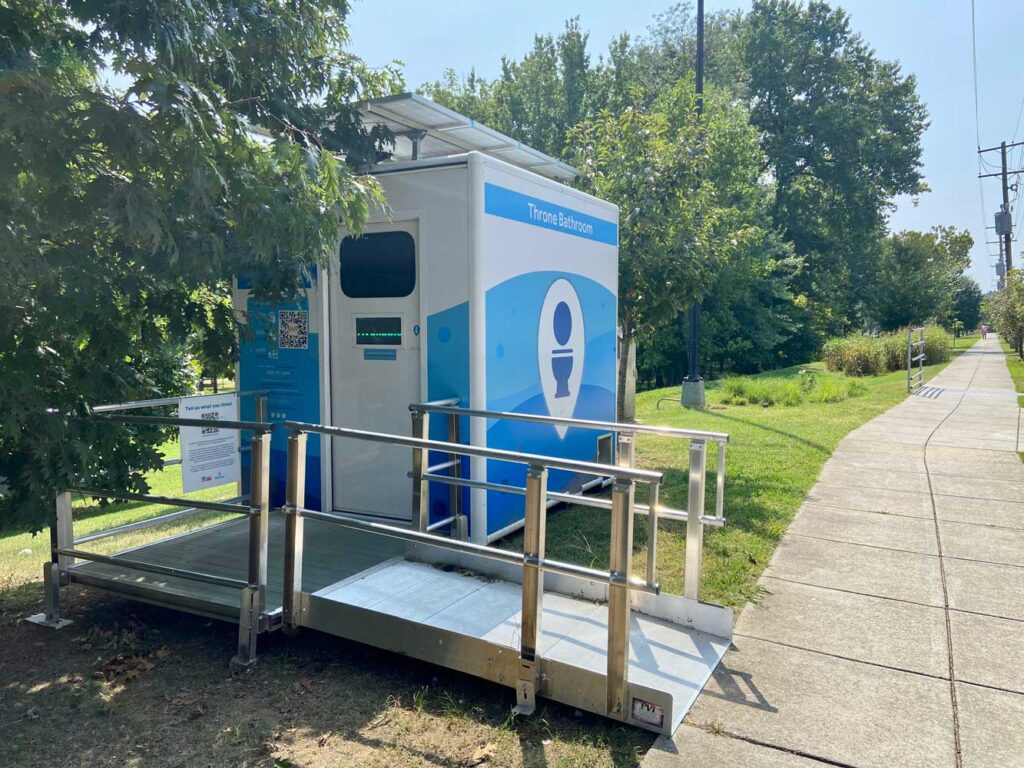
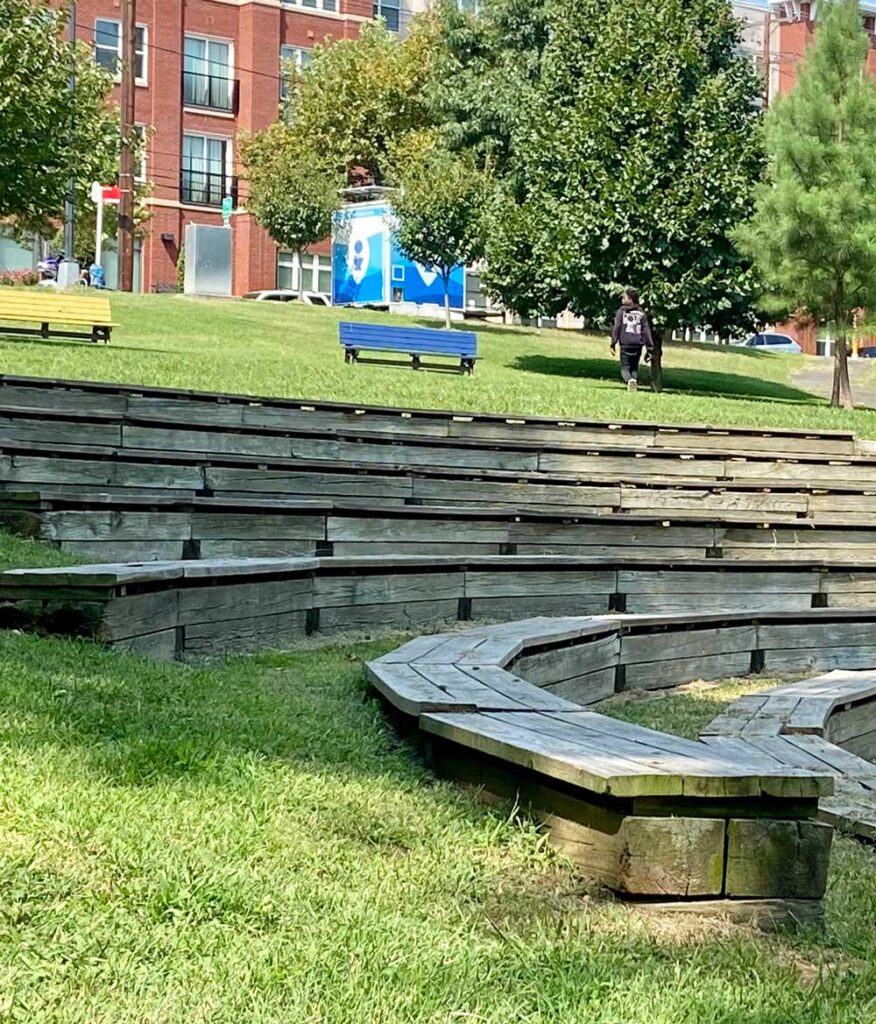 Typically when initiatives like this are proposed, the wealthier parts of the District (Dupont Circle) are prioritized over neighborhoods like Congress Heights. Our ongoing communications with area residents and the Advisory Neighborhood Commission (ANC) for that neighborhood made this happen. While this is a great service, it runs the risk of falling victim to austerity budget cuts and removals. A better, more long-term solution is to build this structure into the ground, have it fully operated by the DC Government, and ensure that it can be accessed without a smartphone.
To move money from the cop budget, you can’t just talk about one piece, but the whole pie. You have to talk about the imbalances of power as represented in the city budget. For example, why do the cops get more money year after year than the public library? But that also means reckoning with the deficiencies and failures within other agencies that people have grown to mistrust. For example, many residents mistrust the DC Dept. of Health and the DC Public Schools. The issues that exist in those agencies must also be addressed, while redistributing the funding these agencies sorely need. To quote Tobi Haslett, “To fix one thing, you have to fix everything.”
Typically when initiatives like this are proposed, the wealthier parts of the District (Dupont Circle) are prioritized over neighborhoods like Congress Heights. Our ongoing communications with area residents and the Advisory Neighborhood Commission (ANC) for that neighborhood made this happen. While this is a great service, it runs the risk of falling victim to austerity budget cuts and removals. A better, more long-term solution is to build this structure into the ground, have it fully operated by the DC Government, and ensure that it can be accessed without a smartphone.
To move money from the cop budget, you can’t just talk about one piece, but the whole pie. You have to talk about the imbalances of power as represented in the city budget. For example, why do the cops get more money year after year than the public library? But that also means reckoning with the deficiencies and failures within other agencies that people have grown to mistrust. For example, many residents mistrust the DC Dept. of Health and the DC Public Schools. The issues that exist in those agencies must also be addressed, while redistributing the funding these agencies sorely need. To quote Tobi Haslett, “To fix one thing, you have to fix everything.”
How To Get Started
We intentionally designed this workshop to be accessible and repeatable. We want to share what we’ve learned with others who want to start their own workshops in their city or town. Circumstances may be different depending on your local chapter budget, but most of the activities are low-cost. For example, if you only have enough money for fruit and snacks, that’s great. If you have a bit more funding, paying a local vendor to provide food to attendees is fine too. And with all of these, make sure you are working with your comrades.Before The Workshop
- Gather your crew. You’ll need a dedicated team of people to help with this. This could be in the form of your working group or coalition, depending on how you’re structured.
- Set a date, time, and location. This may be the most important. Once your team commits to a date, time, and location, everything else will need to happen. From your comms outreach to scheduling internal planning meetings. We learned that 4-6 weeks before the set date was a comfortable amount of time for us to plan.
- Ask for volunteer support. Even setting up one workshop is a huge undertaking, so you’ll need a number of volunteers. You’ll need people to help plan the agenda (more below), workshop facilitators, location scouting, purchase snacks and supplies, print materials, design graphics for comms, researchers to look at your city budget and write original research. On the day of the workshop, you’ll need people to help with childcare, interpretation for ESL (English as a Second Language), and a police liaison.
- Plan the agenda. Keep it very simple and open for late arrivals, newcomers, and interpretation. We tend to schedule 2-3 hours for the workshop, depending on attendance.
- Location scouting: The space should be accessible via public transit, or at least walkable. There should be a playground or a separate play area for kids to be safely supervised. A plus if bathrooms and water fountains are available. If not, it’s a perfect example to show participants that they should demand those things.
- Purchase supplies and snacks. It’s going to be a long workshop and people need to feel comfortable. The most simple can be butcher paper, markers, and crayons. More advanced can include paint and clay. Optional: Search for artists and food vendors.
- Street canvassing a week or two prior to the workshop. Note that this is different from door-knocking. The goal is not to reach homeowners, and those who are less receptive to a defunding event. Instead, reach people who are most vulnerable to police brutality. Those who are often at bus stops, streets, street corners, liquor stores, gas stations. People who often rely on using public space to live, socialize, and get around. Introduce yourselves to the locals, let them know you’ll be in the neighborhood and invite them to stop by. 99% of them will be very receptive and appreciate you.
Day of the Workshop
- Arrive early to set up. We usually give ourselves an hour of setup time to practice what we’ll go over.
- Don’t panic if things don’t go perfectly. 80% of the workshop will be planned, and 20% will need to be figured out throughout the day.
- Participate in artmaking. During the artmaking portion, use the time to offer your ideas as well.
- Relax and have fun! This is like planning a party, and you as organizers and facilitators want to have a good time too.
- Thank everyone for coming and let them know how they can plug in.
- Tear down. Collect artwork for those who want to give them.
After the Workshop
- Decompress and give yourselves time to relax. This was a lot of work, and you should be proud of yourselves.
- Make asks of attendees. After a break, send out texts/emails/calls thanking people for coming and letting them know what’s next. That can depend on how far along you are in your defunding organizing. If you’re further along, the next ask may be to ask attendees to contact their mayor, councilmember/alderman/district rep. about what else they’d like instead of more cops. But if you’re just getting started, this may simply be political education and setting a foundation with residents.



